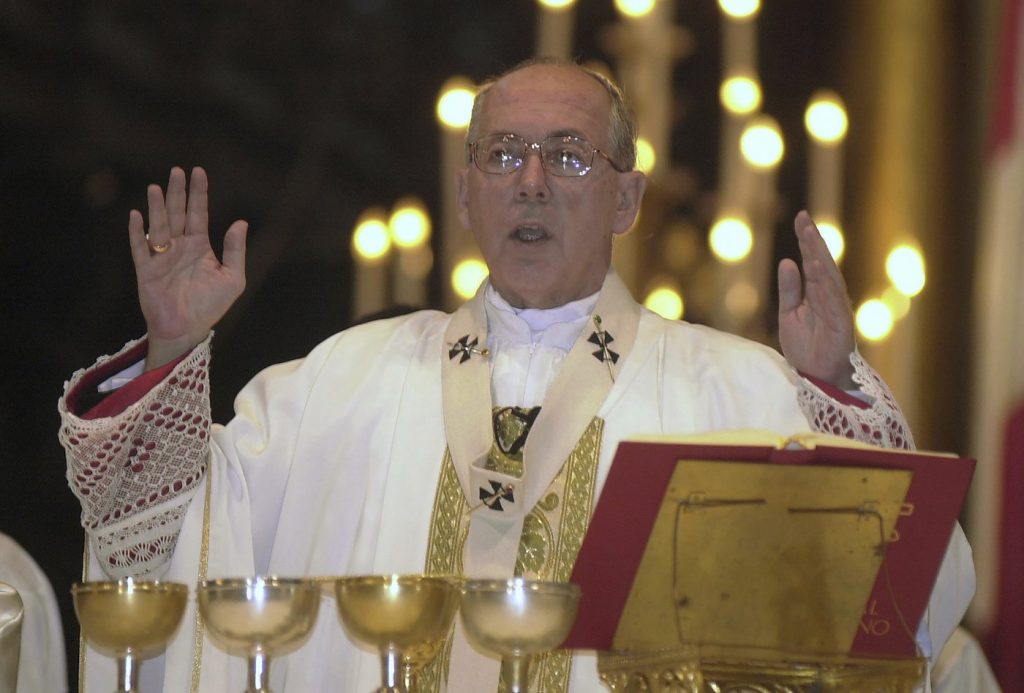VATICAN CITY (AP) – On Sunday, the Vatican reiterated that disciplinary sanctions against Cardinal Juan Luis Cipriani Thorne, the first-ever cardinal from Opus Dei, remain in force due to allegations of sexual abuse. The accusations against Cipriani, the former archbishop of Lima, Peru, have led to significant restrictions on his activities, including a requirement to reside outside of his home country.
Vatican spokesman Matteo Bruni confirmed that the sanctions imposed on the 81-year-old cardinal encompass limitations related to his public activities, place of residence, and the use of certain insignia. Although there are occasions when Cipriani has been permitted to deviate from these restrictions due to his age and family concerns, Bruni stated that the measures are still active. Cipriani, who divides his time between Madrid and Rome, acknowledged the sanctions but vehemently denied the allegations, labeling them as "completely false." In a letter provided by Opus Dei's Rome office, he maintained, "I haven’t committed any crime, nor have I sexually abused anyone in 1983, neither before nor after."
Bruni did not disclose the details surrounding the case but mentioned that the sanctions were enacted after Cipriani retired as head of the Peruvian Church in 2019 due to ongoing allegations against him, implying that more than one accusation exists. The nature of the sanctions mirrors those faced by other high-ranking church officials accused of similar misconduct, such as Archbishop Anthony Apuron of Agana, Guam, and Bishop Carlos Ximenes Belo of East Timor, both of whom were forced to leave their countries and restrict their ministries after facing abuse allegations.
Having led the Peruvian Church for two decades prior to his retirement in 2019, Cipriani became the first cardinal affiliated with Opus Dei—an influential conservative movement founded by Spanish priest Josemaría Escrivá in 1928, which includes over 90,000 members across 70 countries. This movement, which emphasizes the sanctification of secular life, garnered significant favor from St. John Paul II.
The allegations against Cipriani contribute to the turmoil within the Peruvian Church, particularly following Pope Francis's recent decision to dissolve Sodalitium Christianae Vitae, another powerful conservative lay Catholic movement based in Peru. This decision came after a Vatican investigation unveiled sexual abuse by its founder, financial mismanagement by its leadership, and various forms of abuse committed by top members. Cipriani had been in charge of the Peruvian church during the initial public allegations against Sodalitium, which surfaced in 2000 and were formally presented to the church in 2011.
Although Cipriani claimed he addressed the allegations appropriately, the case gained greater attention following the publication of the 2015 book "Half Monks, Half Soldiers" by journalists Pedro Salinas and Paola Ugaz, which exposed the group's illicit practices. Recently, abuse survivor Jose Enrique Escardó met with Pope Francis to discuss the dissolution of Sodalitium and the Church's commitment to prioritizing the victims as they dismantle the movement. Escardó expressed feeling heard and relieved after the meeting, emphasizing the importance of acknowledging the victims' voices amidst the church's slow response to the scandal.
Founded in 1971 as a conservative reaction to the leftist liberation theology movement, Sodalitium was notably influential within Peru and had an estimated membership of around 20,000 at its peak. It also had a U.S. base in Denver. Following last year's Vatican investigation, actions were initiated against the movement, culminating in the expulsion of its founder and significant leaders. The Vatican's recent confirmation to suppress Sodalitium was viewed as a necessary step by many, including long-suffering victims who have accused the Peruvian church hierarchy of complicity.
In a statement, Peruvian bishops expressed their solidarity with the victims of Sodalitium and conveyed their remorse for the situation, while also defending the steps taken by the bishops' conference over the years to address the issues before the Holy See. Their acknowledgment reflects a collective desire to account for past failures and offer greater support for those affected by abuse.











